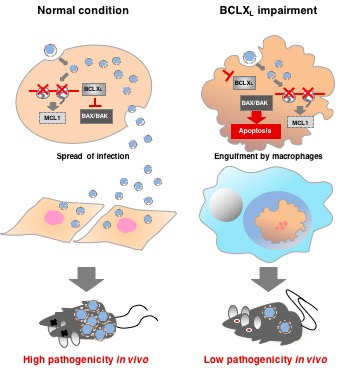Infection with flaviviruses requires BCLXL for cell survival (Matsuura-Lab in PLoS Pathogens)
The genus Flavivirus including Japanese encephalitis virus, Dengue virus, and Zika virus all of which are mosquito-borne human pathogen and cause serious diseases in humans. BCL2 family proteins control mitochondria-mediated apoptosis to maintain cell homeostasis via the removal of damaged cells and pathogen-infected cells. In this study, we examined the roles of BCL2 proteins in the induction of apoptosis in cells infected with flaviviruses. We found that survival of the infected cells depends on BCLXL, a pro-survival BCL2 protein due to suppression of the expression of another pro-survival protein, MCL1. Haploinsufficiency of the BCLXL gene, as well as administration of BCLXL inhibitors, increased survival rate after challenge of JEV infection. These results suggest that BCLXL plays a crucial role in the survival of cells infected with flaviviruses, and that BCLXL may provide a novel antiviral target to suppress propagation of the family of Flaviviridae viruses.
This article was published in Plos Pathogens on Sept 9.
Infection with flaviviruses requires BCLXL for cell survival
Suzuki T, Okamoto T, Katoh H, Sugiyama Y, Kusakabe S, Tokunaga M, Hirano J, Miyata Y, Fukuhara T, Ikawa M, Satoh T, Yoshio S, Suzuki R, Saijo M, Huang DCS, Kanto T, Akira S, Matsuura Y.
Links
- Home
- Achievement
- Research Activities
- Infection with flaviviruses requires BCLXL for cell survival (Matsuura-Lab in PLoS Pathogens)








